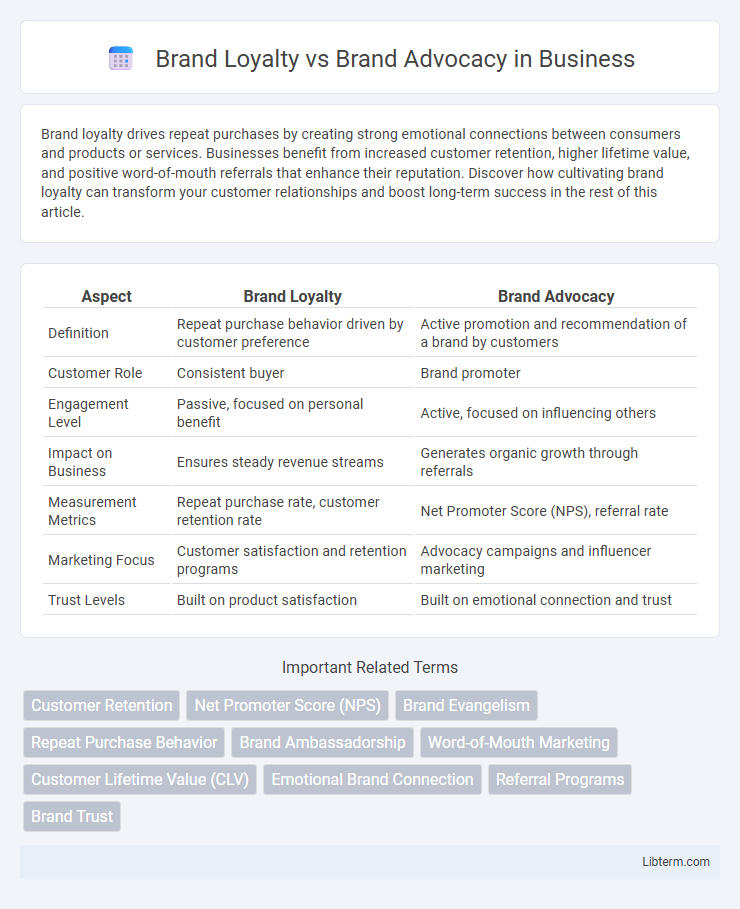Brand loyalty drives repeat purchases by creating strong emotional connections between consumers and products or services. Businesses benefit from increased customer retention, higher lifetime value, and positive word-of-mouth referrals that enhance their reputation. Discover how cultivating brand loyalty can transform your customer relationships and boost long-term success in the rest of this article.
Table of Comparison
| Aspect | Brand Loyalty | Brand Advocacy |
|---|---|---|
| Definition | Repeat purchase behavior driven by customer preference | Active promotion and recommendation of a brand by customers |
| Customer Role | Consistent buyer | Brand promoter |
| Engagement Level | Passive, focused on personal benefit | Active, focused on influencing others |
| Impact on Business | Ensures steady revenue streams | Generates organic growth through referrals |
| Measurement Metrics | Repeat purchase rate, customer retention rate | Net Promoter Score (NPS), referral rate |
| Marketing Focus | Customer satisfaction and retention programs | Advocacy campaigns and influencer marketing |
| Trust Levels | Built on product satisfaction | Built on emotional connection and trust |
Understanding Brand Loyalty and Brand Advocacy
Brand loyalty refers to a customer's consistent preference for a specific brand due to satisfaction, trust, and positive experiences, leading to repeat purchases over time. Brand advocacy goes beyond loyalty, involving customers actively promoting and recommending the brand to others, driven by emotional connection and genuine enthusiasm. Understanding these concepts helps businesses cultivate long-term relationships and harness word-of-mouth marketing for sustained growth.
Key Differences Between Brand Loyalty and Brand Advocacy
Brand loyalty refers to customers consistently choosing a particular brand due to positive experiences, emotional attachment, or perceived value, while brand advocacy involves actively recommending and promoting the brand to others. Key differences include motivation, where loyalty is driven by personal satisfaction and habit, whereas advocacy is fueled by a desire to influence others based on trust and enthusiasm. Loyalty primarily impacts repeat purchases, whereas advocacy expands brand reach through word-of-mouth and social proof.
Psychological Drivers Behind Brand Loyalty
Psychological drivers behind brand loyalty include emotional attachment, trust, and perceived value, which create a deep connection between consumers and a brand. Consistent positive experiences and fulfillment of consumer needs reinforce loyalty by building confidence in the brand's reliability and quality. Brand loyalty focuses on repeat purchases and preference, whereas brand advocacy involves active promotion and recommending the brand to others.
What Fuels Brand Advocacy?
Emotional connection and trust significantly fuel brand advocacy by transforming satisfied customers into passionate promoters who actively recommend brands to others. Consistently delivering exceptional product quality, personalized experiences, and responsive customer service strengthens this bond, encouraging genuine word-of-mouth referrals. Social proof and community engagement further amplify advocacy by creating a sense of belonging and authentic endorsement among consumers.
Measuring Brand Loyalty: Metrics and Methods
Measuring brand loyalty involves tracking key metrics such as repeat purchase rate, customer retention rate, and Net Promoter Score (NPS) to evaluate consistent consumer commitment to a brand. Methods include analyzing purchase frequency, customer lifetime value (CLV), and engagement levels through surveys, transactional data, and social media interactions. These quantitative and qualitative approaches provide insights into customer satisfaction, likelihood of repurchase, and brand recommendation behaviors essential for distinguishing loyalty from advocacy.
Metrics for Assessing Brand Advocacy
Metrics for assessing brand advocacy include Net Promoter Score (NPS), which measures customer willingness to recommend a brand to others, and Customer Referral Rate, indicating how often customers actively promote the brand. Social media engagement metrics such as shares, mentions, and positive reviews provide quantifiable insights into advocacy levels. Tracking customer-generated content and sentiment analysis further helps quantify the strength and authenticity of brand advocates.
The Impact of Customer Experience on Loyalty and Advocacy
Customer experience directly influences brand loyalty by creating positive emotional connections and trust, leading to repeated purchases and long-term commitment. Exceptional experiences transform loyal customers into brand advocates who actively promote the brand through word-of-mouth and social media, amplifying organic growth. Consistently exceeding customer expectations fosters both loyalty and advocacy, driving sustained business success.
Strategies to Convert Loyal Customers into Advocates
Implement personalized engagement strategies that reward loyal customers with exclusive offers, early access, or VIP experiences to enhance their emotional connection with the brand. Leverage social proof by encouraging satisfied customers to share testimonials and reviews on social media platforms, amplifying positive word-of-mouth and increasing brand visibility. Implement referral programs that incentivize loyal customers to recommend products or services to their network, effectively converting loyalty into active brand advocacy.
Case Studies: Successful Brands Leveraging Loyalty and Advocacy
Case studies of successful brands like Apple and Starbucks reveal that brand loyalty drives repeat purchases through consistent customer experience, while brand advocacy amplifies word-of-mouth referrals and organic growth. Apple's loyal customer base not only returns for new products but actively promotes the brand via social media and community forums, boosting its market reach. Starbucks leverages loyalty programs to cultivate repeat customers and employs advocacy strategies by encouraging user-generated content and local engagement, strengthening brand trust and expanding its customer network.
Brand Loyalty vs. Advocacy: Which Drives Sustainable Growth?
Brand loyalty fosters repeat purchases by creating emotional connections and trust between consumers and a brand, ensuring consistent revenue streams. Brand advocacy, however, leverages passionate customers who actively recommend the brand, amplifying reach and credibility through word-of-mouth marketing. Sustainable growth is driven more effectively by brand advocacy as it transforms loyal customers into brand ambassadors, expanding market share and enhancing long-term brand equity.
Brand Loyalty Infographic

 libterm.com
libterm.com